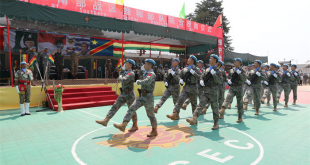China will contribute more manpower and resources to United Nations’ peacekeeping missions, support UN reforms to improve peacekeeping effectiveness and enhance global cooperation to jointly build lasting peace and prosperity around the world, officials said on Friday.
As this year marks the 30th anniversary of China’s participation in such missions, as well as the fifth anniversary of President Xi Jinping’s attending the Leaders’ Summit on UN Peacekeeping, the State Council Information Office issued the nation’s first white paper detailing China’s involvement in UN peacekeeping missions on the same day.
Over the past three decades, China has sent over 40,000 peacekeepers to 25 missions around the world. These missions helped oversee cease-fires, stabilize regional situations, protect civilians and assets and provide logistical and infrastructure support, according to the white paper.
Since 2015, China has established an 8,000-strong peacekeeping standby force, dispatched over 7,000 logistics support personnel and trained over 2,800 peacekeepers for 60 countries. Now, China has 2,521 blue helmets in eight missions around the globe.
Major General Luo Wei, director of the Peacekeeping Affairs Office at the Ministry of National Defense, said the Chinese blue helmets have faithfully performed their duties, with 16 soldiers having sacrificed their lives.
“The international security situation is increasingly unstable and uncertain and world peace is facing various threats,” Luo said, adding that these changing times mean there are more restrictions and challenges when conducting peacekeeping missions, which are also getting more strenuous and complex by the day.
Luo said being a permanent member of the UN Security Council, China will resolutely support and partake in UN peacekeeping operations and support the Action for Peacekeeping initiative launched by the UN. China will also back the UN taking necessary measures to reform peacekeeping operations, he added.
Senior Colonel Ren Guoqiang, spokesman for the Ministry of National Defense, said China will provide more personnel and resources to support UN peacekeeping missions, help improve the missions’ effectiveness and enhance international collaboration.
Senior Colonel Lu Jianxin, a professor of international studies at National University of Defense Technology and a senior instructor for peacekeeping affairs, said foreign media and politicians often misinterpret China’s motive for peacekeeping missions, claiming it is a means to expand the Chinese military’s global presence or to merely protect Chinese interests overseas.
“These notions expose their lack of basic understanding of how peacekeeping works,” Lu said. “Chinese peacekeepers operate under the framework and command of the UN, and they must be invited by the organization and be approved by the mission’s host country before deployment.”
“We’re carrying out peacekeeping duties for the UN, not for individual countries,” he said. Apart from “boots on the ground” support, China will also continue to take part in forming policies and regulations, instruction manuals and training courses for peacekeeping operations, Lu added.
Senior Colonel Pan Qinghua, an official from the Political Work Department of the Central Military Commission, said Chinese peacekeepers are not only well-trained and disciplined, they also often help locals by providing medical assistance, transportation and other services.
At Bukavu in the Democratic Republic of the Congo, Chinese blue helmet medical staff help local children with their studies. “The children called our female Chinese peacekeepers ‘Chinese mama’,” Pan said. “This torch of love has been passed down for over 17 years now, and has become a household story.”
Pan said a Chinese peacekeeper was once asked why he wanted to travel across the world to maintain peace in danger zones. The peacekeeper wrote the reply in his diary, saying, “Because we need to protect the bottom line of human civilization.”
“The greatest value of a soldier is not just to win wars, but to prevent wars,” Pan said. “Winning wars requires power, but winning peace needs even greater power and good will. It needs love and responsibility.”
China daily
 Africa -China Review Africa -China Cooperation and Transformation
Africa -China Review Africa -China Cooperation and Transformation
